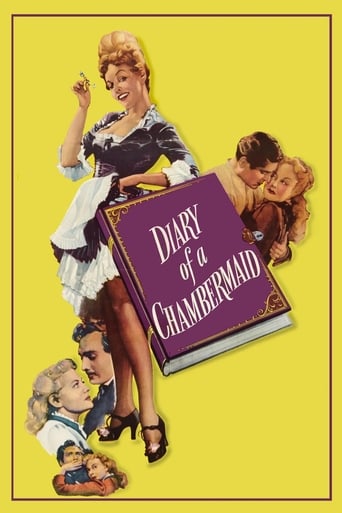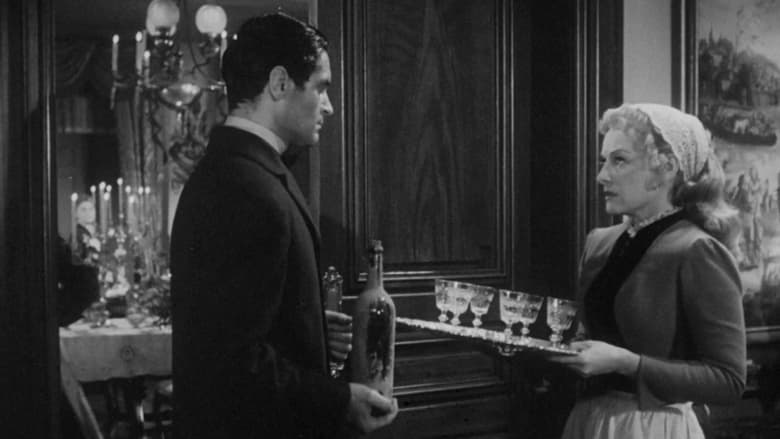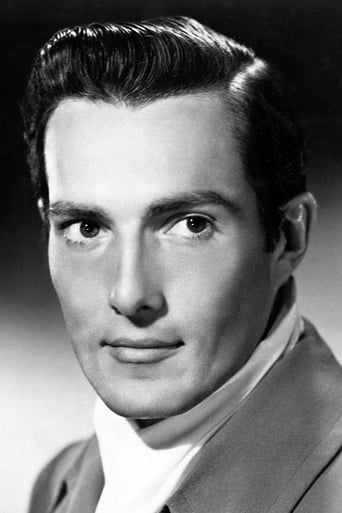

The Diary of a Chambermaid (1946)
Celestine, the chamber-maid, has a new job in the country, at the Lanlaires. She has decided to use her beauty to seduce a wealthy man, but Mr. Lanlaire is not a right choice: the house is firmly controlled by Madame Lanlaire, helped by the strange valet Joseph. Then she tries the neighbour, former officer Mauger. This seems to work. But soon the son of the Lanlaires comes back. He is young, attractive and does not share his mother's antirepublican opinions. So Celestine's beauty attracts Captain Mauger, young Georges Lanlaire, and Joseph. Three men, from three different social classes, with three different conceptions of life. Will Celestine be able to convince Georges of her sincerity?
Watch Trailer
Cast
Reviews
Don't listen to the Hype. It's awful
Simple and well acted, it has tension enough to knot the stomach.
This is a small, humorous movie in some ways, but it has a huge heart. What a nice experience.
It is an exhilarating, distressing, funny and profound film, with one of the more memorable film scores in years,
It has a touch that seems like the actors are fooling around. Total, not seriously, that's all. Especially towards the end. At first it is fine but it is losing bellows and as is customary in Renoir, it mixes the genres in such a way that it does not make any sense.Spoiler:I do not know if it has ulterior motives although it seems to me that yes and I do not like anything, I speak of incest. It is clear that horns are spoken.The neighbor, is not that character unbearable? Always jumping.Why does Paulette want to go with Francis? That man is scary. He has not felt anything for him in the whole movie. For money? But he has the son and on top he gets along with him.The ending, it seemed a bad movie of laughter, could not believe that it had degenerated so much the film. I will not go into technical sections. Or I like none.In the end I did not know if they were laughing at me or what
The Diary of a Chambermaid is a transitional film in the development of Renoir's lesser known stylistic system. Braudy would later distinguish Renoir's two systems as being tied to theater and realism respectively (although there have been compelling arguments about these categories being either reductive or simply misnomers). Goddard is the focus of the story (much in the same way Renoir later uses Magnani, Arnoul and Bergman). The camera tracks her action, her closeups are one-shot, there are alternating shot scales in single scenes to emphasize her character's psychological reaction to events, studio exteriors help idealize the framing of her screen personality and high/low angle shots purvey her psychological perspective on group dynamics. Celestine (Goddard) has an ambiguity to her motivation that heightens psychological identification. It is unclear as to whether she sees the world divided into classes or sexes, or both. The ending is a happy one, and the politics is further subverted through jovial and emotionally-charged highly-individualized characters. Non-diegetic soundtrack is employed to increase distinctions in the emotional responses of different characters. Depth of field is at the service of Celestine's staging while obstructions in the mise-en-scene become incorporated into the plot. In this respect, the camera is not an unobtrusive one. There is an inconsistency in the use of stylistics, where on one hand reframing pans are fully at the service of psychological identification and privilege of the transcendental subject position while the long take mobile framing of the July 14th celebration reminisce on M.Lange, Illusion and Regle. Diary is a melodrama with comedic elements to take the edges off, but when the master of the house reads in the morning paper "another woman murdered in Paris, another woman cut to pieces" there is no doubt that Renoir is infusing a consideration for the plight of women in a misogynist society. This was very important to him and perhaps the dark undertones of this film have something to say about the repression he experienced working in Hollywood for the war. How Burgess Meredith factors into all that remains to be seen.
This film is not to be confused with the film by the same name which was made in 1964 by the famed director Luis Buñuel. While the theme of a conniving maid who is using her wiles to get ahead is in both and they have the same name, otherwise the films are very dissimilar--mostly because the bizarreness of Buñuel's version is missing. No foot fetishes, no rape, no murder and no antisemitism in the 1946 film! Jean Renoir's vision for the story is light-years different from Buñuel's. Personally, I think both versions have their strengths and both have their flaws, but I think the latter version is a bit better.Paulette Goddard plays the title role. She is a conniving woman who comes to her new home as a maid in order to marry a rich man. She's mostly interested in the master's son--but the young man is an indifferent suitor at best (Hurd Hatfield). There's also the old and VERY wacky neighbor (Burgess Meredith) and the valet--played in a very creepy manner by Francis Lederer. Who will she get by the end of the film? And, unfortunately, who care? My biggest problem with this film is Goddard. I have long wondered why she got so many plum roles as she was only a fair actress--and here she often overplays her part. Any sort of subtlety is missing from her portrayal--and the role really needed this, as the woman SHOULD have been played like a master manipulator. As far as the direction goes, it wasn't bad--and had the nice look Jean Renoir was noted for in his films. But he probably should have reigned in a few of the more florid portrayals (not just Goddard's)--though Lederer was BRILLIANT and the best thing about the film. Also, Goddard's character was a bit too sympathetic--she should have been much more amoral and manipulative in order to make the movie more enjoyable. Overall, I prefer the 1964 version a bit more--though I think this film could use yet another remake--one that is more subtle and without the weird 'extras' Luis Buñuel put in his film that tended to distract the viewer. Worth seeing but nothing more--and it should have been better. A great script idea that should have been even better--and juicier.FYI--Burgess Meredith and Paulette Goddard were married while they were making this film. Seeing Meredith wearing so much makeup and playing a very old man was rather funny--as they are almost the same age.
Chambermaid Paulette Goddard (Celestine) and the feeble, irritating Irene Ryan (Louise) arrive at the stately home in which they are to serve. They first meet the rather unpleasant valet, Frances Lederer (Joseph) before being introduced to Reginald Owen (Captain Lanlaire) and his wife Judith Anderson (Madame Lanlaire), who have an ill son, Hurd Hatfield (George). It becomes clear that it is Goddard's role to make his life better. Can she succeed....? Paulette Goddard, Frances Lederer and Judith Anderson carry the film in terms of having a good cast but I'm afraid that's it. The film suffers by having too many buffoons - virtually everybody else. While Reginald Owen is OK as a bumbling old man, one is enough for any film. Unfortunately, we are also given Burgess Meredith as an extremely annoying old codger of a neighbour - he must be the most annoying character EVER. He constantly jumps and bounces around just like all old people do - you get my drift? He is so unconvincing that it's embarrassing. He is meant to be a likable, cheeky chappy. He isn't. Frances Lederer has a great moment with him towards the end of the film. Marvelous! Frances Lederer keeps the tension ticking and is very watchable as the valet with something sinister going on in his head. The plot is good and keeps us watching as to how things will pan out for Goddard. Time to check the silverware.


